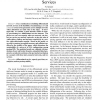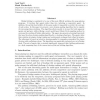277 search results - page 35 / 56 » A Model for Multiple Outcomes Games |
AAAI
2010
13 years 10 months ago
2010
Recent research has shown that surprisingly rich models of human behavior can be learned from GPS (positional) data. However, most research to date has concentrated on modeling si...
INFOCOM
2000
IEEE
14 years 6 days ago
2000
IEEE
A key consideration in building differentiated network services is the feasibility of maintaining stable and consistent service level agreements across multiple networks where allo...
ML
2006
ACM
13 years 8 months ago
2006
ACM
Bridge bidding is considered to be one of the most difficult problems for game-playing programs. It involves four agents rather than two, including a cooperative agent. In additio...
CORR
2011
Springer
13 years 3 months ago
2011
Springer
Modeling the behavior of imperfect agents from a small number of observations is a difficult, but important task. In the singleagent decision-theoretic setting, inverse optimal co...
MONET
2011
12 years 11 months ago
2011
Cooperation among wireless nodes has been recently proposed for improving the physical layer (PHY) security of wireless transmission in the presence of multiple eavesdroppers. Whil...


